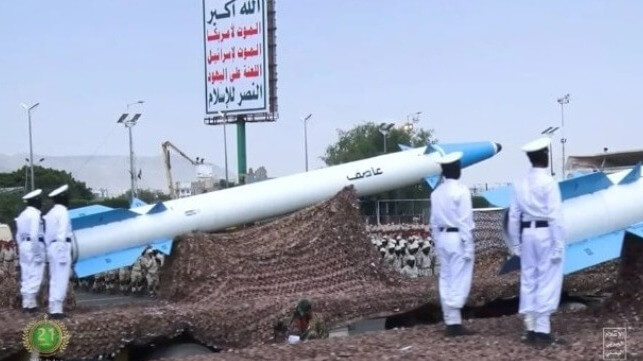Report: IRGC Now Handles Half of Iran's Oil Exports

Iran's oil exports are intimately linked to the Islamic Revolutionary Guard Corps' military training and assistance programs in the Middle East, including the weapons transfers that enable Houthi attacks on Red Sea shipping. The IRGC's share of Iran's oil export volume now exceeds 50 percent, according to Reuters - even as the isolated nation's oil sales have declined.
Under Western sanctions, Tehran is highly dependent on oil exports to keep government functions running. Iran's oil sector is state-run, and it was once a vertically-integrated enterprise under the National Iranian Oil Company (NIOC), which handled everything from exploration to production, marketing, terminal operations and tanker transport. When the Obama administration imposed sanctions on the Iranian economy in 2011-12, ordinary commercial channels for Iran's oil shipments began to shut down, and the IRGC stepped in to provide covert means of marketing and transport. “The IRGC guys were much, much better at smuggling," explained Richard Nephew, a researcher and former deputy special envoy for Iran, speaking to Reuters.
That pattern intensified when the Trump administration reimposed sanctions on Iran in 2018, and the IRGC has come to dominate Iran's oil export trade, underwriting the organization's influence at home and abroad. Security sources told Reuters that the IRGC sells its oil at an extra discount because of the risk of doing business with a U.S.-listed terrorist organization. China's teapot refiners buy the overwhelming majority of this black-market oil, leveraging its low cost to improve their narrow margins.
Iran's oil sales to China have slackened in recent months. According to TankerTrackers.com, which closely monitors tanker movements to determine real trade volumes, Iranian exports dropped to 1.2 million barrels per day in the first half of December, a decline of 500,000 bpd compared to the same period in the last three months. Iran's floating oil storage volume - unsold inventory stored on laden tankers, primarily near Singapore - has risen from 36 million barrels to 48 million barrels since September, according to Vortexa and Iran International.
The cuts in Iranian sales volume coincide with a contraction in the teapot refinery sector. China's oil demand has been sluggish, imposing economic stress on independent refiners. Refinery output fell for six months through October, and two of Shandong's small refineries folded in September.
U.S. sanctions on the Iranian "dark fleet" may also have helped reduce sales. The U.S. Treasury blacklisted 45 tankers with ties to Iranian oil earlier this month - though countless other vessels remain involved in the trade.
No comments:
Post a Comment